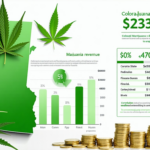Florida Voters Poised to Pass Recreational Marijuana and Abortion Amendments, Poll Suggests
A new poll from the University of North Florida’s Public Opinion Research Lab (PORL) indicates that Florida voters are likely to approve two contentious amendments on the November ballot: recreational marijuana and a right to abortion. The poll shows that 66% of respondents support Amendment 3, which would legalize recreational marijuana, and 60% support Amendment 4, which would protect the right to abortion.
The poll’s margin of error was plus or minus 3.5 percentage points, and the results suggest that both amendments are on track to pass with a supermajority of 60% or more. The fate of abortion in Florida, however, may depend on voter turnout, as support for the amendment has dropped slightly since July.
The PORL poll also found that support for recreational marijuana has increased by two points since July, with 64% of likely voters indicating a “yes” vote. On the other hand, support for the abortion amendment has dropped from 69% in July to 60% currently, with 32% opposed and 8% undecided.
The poll’s findings come as Governor Ron DeSantis’ administration has launched a campaign against both measures, using taxpayer funds to pay for public service announcements attacking the amendments. The administration has also released a report alleging widespread fraud in the petition process that enabled the abortion measure to get on the ballot, although the petition gathering group denies any wrongdoing.
In other poll numbers, former President Donald Trump is leading Vice President Kamala Harris by 10 percentage points in Florida, with 53% of respondents saying they would vote for Trump and 43% for Harris. The poll also found that no one received a majority in the race for U.S. Senate, with Republican incumbent Rick Scott receiving 49% support and Democratic challenger Debbie Mucarsel-Powell getting 46%.
The poll’s methodology included a random sample of 977 likely Florida voters across the state’s 10 major media markets, conducted from October 7-18. The poll’s results are based on a mix of landline and cell phone numbers, and respondents were included in the sampling frame if they had voted in any of the 2016, 2018, 2020, or 2022 general elections or the 2020, 2022, or 2024 primary elections.












